Books
Books

Dysphoria Mundi: A Diary of Planetary Transition
A revolutionary book tracing the collapse of the paradigms that have organized the world for centuries.
In Dysphoria Mundi, Paul B. Preciado, best known for his 2013 cult classic Testo Junkie, has written a mutant text assembled from essays, philosophy, poetry, and autofiction that captures a moment of profound change and possibility. Rooted in the isolation of the COVID-19 pandemic, and taking account of the societal convulsions that have ensued, Preciado tries to make sense of our times from within the swirl of a revolutionary present moment.
The central thesis of this monumental work is that dysphoria, to be understood properly, should not be seen as a mental illness but rather as the condition that defines our times. Dysphoria is an abyss that separates a patriarchal, colonial, and capitalist order hurtling toward its end from a new way of being that, until now, has been seen as unproductive and abnormal but is in fact the way out of our current predicament.
With echoes of visionaries such as William S. Burroughs and Kathy Acker, Preciado’s theoretical writing is propelled by lyric power while providing us with a critical toolbox full of new concepts that can guide our thinking and our transition, cognitive emancipation, denormalization, disidentification, “electronic heroin,” digital coups, necro-kitsch. Dysphoria Mundi is Preciado’s most accessible and significant work to date, in which he makes sense of a world in ruins around us and maps a joyous, radical way forward.

Theory & Practice
With echoes of Shirley Hazzard and Virginia Woolf, a new novel of startling intelligence from prize–winning author Michelle de Kretser, following a woman looking back on her young adulthood, and grappling with the collision of her emotions and her values.
In the late 1980s, the narrator of Theory & Practice—a first generation immigrant from Sri Lanka who moved to Sydney in her childhood—sets up a life in Melbourne for graduate school. Jilted by a lover who cheats on her with another self-described "feminist," she is thrown into deeper confusion about her identity and the people around her.
The narrator begins to fall for a man named Kit, who is in a “deconstructed relationship” with a woman named Olivia. She struggles to square her feminism against her jealousy toward Olivia—and her anti-colonialism against her feelings about Virginia Woolf, whose work she is called to despite her racism.
What happens when our desires run contrary to our beliefs? What should we do when the failings of revered figures come to light? Who is shamed when the truth is told? In Theory & Practice, Michelle de Kretser offers a spellbinding meditation on the moral complexities that arise in this gap. Peopled with brilliantly drawn characters, the novel also stitches together fiction and essay, taking up Woolf’s quest for adventurous literary form.

My Mother My Home
Who claims abstraction? What are the limits of abstraction? Are statelessness, dislocation and feelings of (un) belonging embodiments of an abstracted self that is in itself a work in progress? How could performance art—an artistic practice that places significant importance on presence and legibility of form—transgress into the realm of the abstract and the illegible in an effort to protect the artist’s likeness while shedding light on what it means to be in their body in relation to this world?
Chipo Chipaziwa’s My Mother My Home establishes itself as a query on the aspects of belonging and the artist’s own personhood that acts as the foundation of her practice. The question of where one’s personhood begins and ends within an artwork has appeared to be ever prevalent within the realm of visual art and is more relevant within the canon of performance art.
Writers: Chipo Chipaziwa, Denise Ferreira Da Silva, Olumoroti George
Contributing Artists: Margaret Joba-Woodruff, Sophia Lapres, and David Ezra Wang
Edited by Katrina Geotjen

Royal Academy of Fine Arts Antwerp
Know how to now it’s that you’re learning the segments That aren’t sentences at all and converse with each other
This book is the result of the symposium Know how to now it’s that you’re learning the segments / That aren’t sentences at all and converse with each other which took place at the Royal Academy of Fine Arts Antwerp on 14–15 September 2023.
Published by Track Report as a result of Andrea di Serego Alighieri’s two-years research at ArchiVolt.
With contributions by Phil Baber, Chloe Chignell, Will Holder, Alice Notley, Andrea di Serego Alighieri, Nicola Masciandaro, Angela Xu, Snejanka Mihaylova, Paul Abbott, Mayra A. Rodríguez Castro

Delirious Verse
Delirious Verse presents the first English translation of a talk given by the Italian poet Amelia Rosselli in the early 1980s, in which she read aloud from and expanded upon her seminal essay “Metrical Spaces.” Drawing on intensive literary and musical studies, and shaped by her trilingual upbringing as a refugee from fascist Italy, Rosselli conceptualizes a new kind of poetic form: a graphic-prosodic “time-space” capable of containing “all possible imaginable rhythms.”
The book includes a new translation of “Metrical Spaces” by Jennifer Scappettone and an afterword by Andrea di Serego Alighieri.
Edited and translated by Andrea di Serego Alighieri and Phil Baber.

Blank Forms #10 – Alien Roots
The tenth and final anthology from Blank Forms offers an exceptional insight into the work, working methods and thinking of the French pioneer of musique concrète and electroacoustic composition Éliane Radigue, through key texts, a wealth of archival documents (including correspondence, notes and sketches for works, concert flyers, photographs, drawings, reviews, etc.), in-depth interviews and commissioned essays.
This volume explores the early electronic work of French composer Éliane Radigue, whose radical approach to feedback, analog synthesis, and composition on tape has long evaded historical and technical interpretation. Combining key texts, newly translated primary documents, in-depth interviews, and commissioned essays, this compendium interrogates the composer's idiosyncratic compositional practice, which both embraces and confounds the iterative nature of magnetic tape, the subtleties of amplification, and the very experience of listening.
Among these entries is an in-depth overview by cellist Charles Curtis, a close collaborator of Radigue's, examining the composer's earliest experiments with feedback techniques and analog synthesis, her eventual shift to composing for unamplified instruments and live performers, and her unique aesthetic configurations of time and presence. A number of detailed conversations between the composer and researchers Georges Haessig, Patrick de Haas, Ian Nagoski, and Bernard Girard provide crucial insights into her working methods at different points throughout her career. Religious studies scholar Dagmar Schwerk reflects upon Radigue's profound 1988 synthesizer work, Kyema, in the context of Tibetan Buddhist thought and its history, while texts by musicians Daniel Silliman and Madison Greenstone examine, in notably different ways, the technical characteristics of Radigue's sound practice. Sketches for unrealized work, contemporary reviews, concert programs, and other ephemera mapping the performance history of Radigue's early work are presented together for the first time. The anthology concludes with a roundtable discussion between Curtis, Greenstone and Anthony Vine, untangling the knot of paradoxes at the center of Radigue's artistic practice to trace the thread of her continued "ethos of resistance."
Edited by Lawrence Kumpf and Charles Curtis.
Texts by Éliane Radigue, Charles Curtis, Georges Haessig, Patrick de Haas, Ian Nagoski, Bernard Girard, Dagmar Schwerk, Daniel Sillman, Madison Greenstone, Anthony Vine.
Blank Forms' journal brings together a combination of never-before published, lost, and new materials that supplement Blank Forms' live programs. It is envisioned as a platform for critical reflection and extended dialogue between scholars, artists, and other figures working within the world of experimental music and art.
Éliane Radigue (born 1932 in Paris) is considered one of the most innovative and influential contemporary composers, from her early electronic music through to her acoustic work of the last fifteen years. Influenced by musique concrète and shaped by regular sojourns in the United States, where she discovered analogue synthesisers, her work unfolds an intensity which is at once subtle and monumental. Through her deep reflections on sound and listening, not only her music but also her working methods have come to shape a widely resonating set of new parameters for working with sound as musical material.
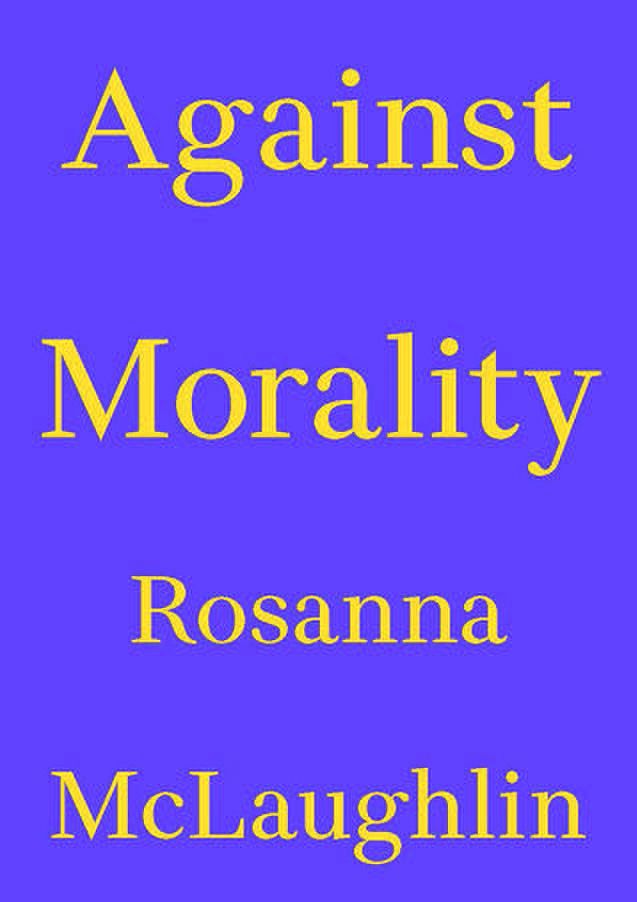
Against Morality
A manifesto against the current moralizing trend in the arts.
Should art be determined by political ideals? In recent decades art institutions have sought to embody liberal values of universal equality and social justice. This move toward greater inclusivity has borne witness to a countervailing trend: artworks are increasingly scrutinized for their political implications, and artists must take care not to transgress particular moral fault lines.
Examining contemporary exhibitions as well as works of art and film, and the broader cultural reactions to them, Rosanna McLaughlin investigates the consequences of this moralizing approach to creative work. She invites us to rethink the connection between political values and art—and to ask whether a relationship between them should exist at all. In arguing against morality in the arts, McLaughlin lays the groundwork for a more expansive concept of difference in twenty-first-century art making.
"What if ambivalences were seen as productive, and not a danger to erase? Would we not begin to know ourselves better? What is it that we are so afraid of finding out? Art is a testing ground for ideas, a means of reaching. What a shame, if we use the space it offers to destroy it entirely."
Rosanna McLaughlin is a writer based in East Sussex and the author of Double-Tracking: Studies in Duplicity (2019) and Sinkhole (2023). Her writing on art and culture has featured in ArtReview, Frieze, Granta, The Guardian, and The White Review, among other publications. Between 2021 and 2023 she was co-editor of The White Review.
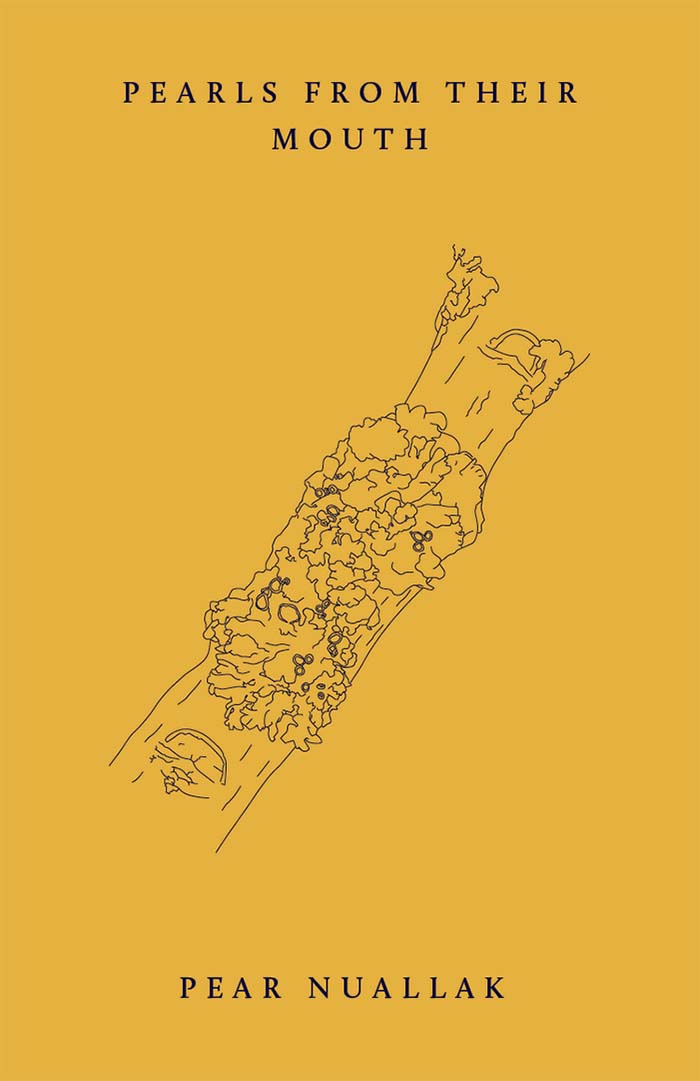
Pearls from Their Mouth
This book is built of stories and provocations—like the birth of a pearl, it transforms that which irritates, layer by layer.
Through speculative fiction and critical essays, Pear Nuallak explores what happens when messy, desiring bodies collide with the hard edge of power. The world’s neat categories are unmade and rewritten, revealing that racial capitalism’s myths are just as much fantasies as Thai bird princesses and transgender magic.
Moving playfully across folktale, horror, satire and critique, Nuallak examines how different beings are formed politically, bodily and emotionally. We discover interdimensional fungi resisting colonisation, queer monsters living on Hampstead Heath, and a mysterious canal running through the ruins of capitalism into interstitial realms. We test the borders of queer diasporic nationalism and take apart the racially melancholic memoir. In this fiery yet delicate collection, we aren’t bound by truth, but flow with it into new worlds.
Pear Nuallak is a visual artist and writer from London. They run community art workshops and co-organise a queer social hub with the Black Cap Community Benefit Society. Their writing has been published in The Dark and Interfictions. Pearls from Their Mouth is their first book.
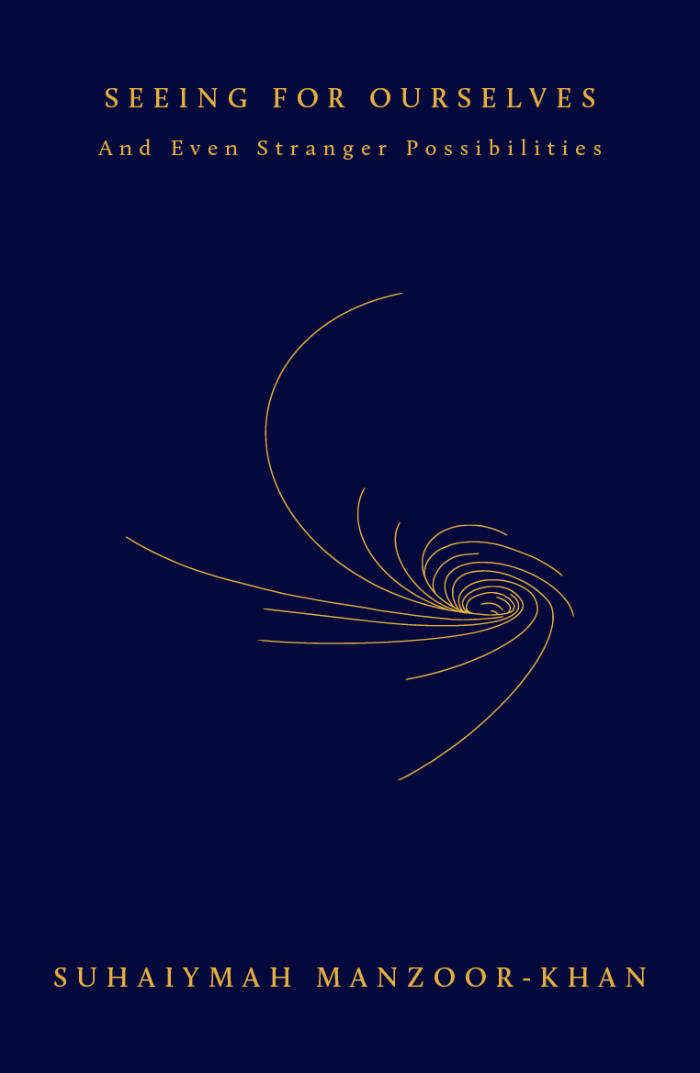
Seeing for Ourselves
Why do we yearn to be seen when we are already far too visible? How do we want to be perceived, and how are we exposed? Could we ever really see for ourselves?
In memoir, vignettes, poetry and essays, Suhaiymah Manzoor-Khan records her observations from the stands at the dizzying circus of being seen and unseen. She surveys the criminalising stadium of civic life, the open-air arenas of family, friendship and grief, the performative pageantry of the public eye and the unclad secrets of the self in solitude, paying attention to what’s on show and what goes undetected.
Perhaps the strangest, most exciting possibilities are opened when we surrender to another kind of sight. Submitting to the gaze of the Unseen and the All-Seeing, Manzoor-Khan invites us to close our eyes and discover what it would mean to look with our souls instead.
Suhaiymah Manzoor-Khan is a poet and writer whose work disrupts assumptions about history, race, violence and knowledge. She is the author of Tangled in Terror and the poetry collection Postcolonial Banter; a co-author of A FLY Girl’s Guide to University; and a contributor to the anthologies Cut from the Same Cloth? and I Refuse to Condemn. She is based in Leeds and is currently writing for theatre.

Sambac Beneath Unlikely Skies
Tender yet brutal vignettes on a girlhood in Gaza, Palestine, filled with honey and warmth.
Winner of the Creative Award in the 2022 Palestine Book Awards.
Chosen as a 2021 Book of the Year by The White Review, Middle East Eye & The New Arab.
Sambac Beneath Unlikely Skies is written for those who had to leave—collected remembrances of a childhood in Gaza by a woman far from Palestine’s sun and sea. Overindulgent, chaotic and sentimental, Heba Hayek’s narrator struggles to navigate life in colder, unfamiliar worlds. She holds tightly to memories of home, hoping they will lead back to her sisters and mothers.
With brilliance and grace, Hayek’s vignettes explore the methods of survival nurtured by Palestinian women in the face of colonial occupation and patriarchy—the power of community care, and of loving what’s not meant to be loved. Her reflections reveal the intimate magnificence and quiet devastation of everyday life: a family drive on the shore, waxing for the first time with aunties, or peeling figs while waiting at a checkpoint.
Heba Hayek is a London-based, Gaza-raised Palestinian author, creative and facilitator. She completed an MFA in Creative Writing at Miami University, Ohio, and studied for an MA in Social Anthropology at SOAS University of London.
Heba’s first book, Sambac Beneath Unlikely Skies, won the Creative Award in the 2022 Palestine Book Awards and was chosen as a 2021 Book of the Year by The White Review, Middle East Eye and The New Arab.
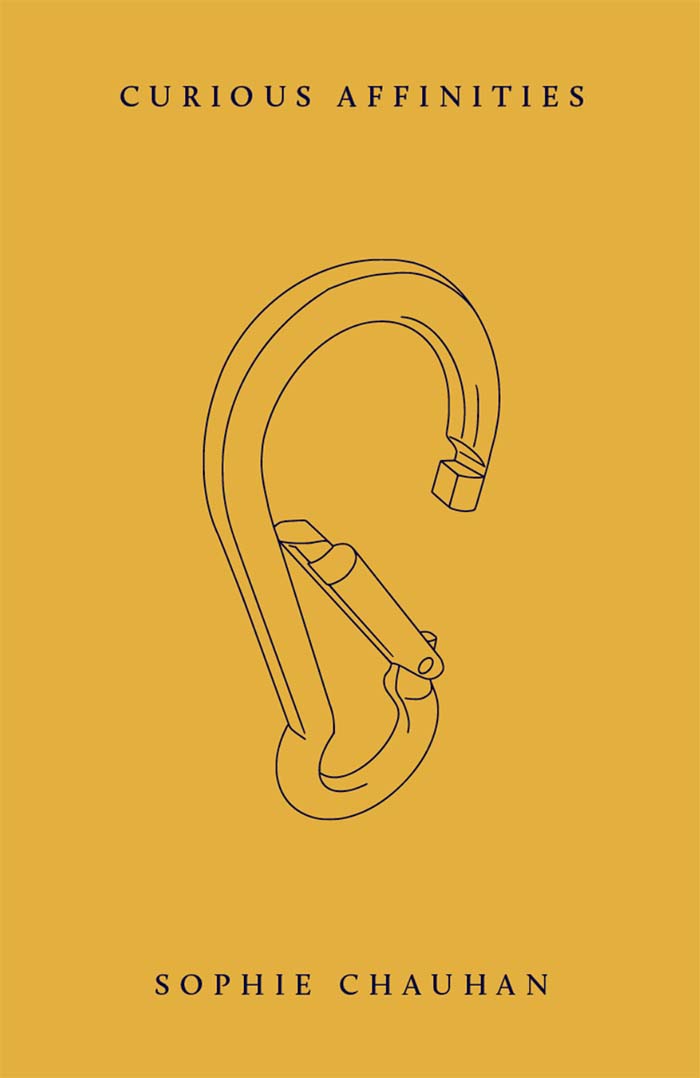
Curious Affinities
How much distance and difference can intimacy hold? How much proximity and likeness does it require? What can we learn from its capacities? And what could we salvage from its limits?
Curious Affinities unravels the risks and possibilities brought forth by unconventional styles of intimacy. Across kinship, friendship, romance and community, the threads of social relation are entangled by race, class and queerness in unexpected and generative ways, as we find ourselves rent to shreds and stitched back together in the name of common feelings.
In rousing poetry and incisive prose, Sophie Chauhan reflects on the bonds and boundaries that govern our collective ways of life and wonders how they might be reimagined.
Sophie Chauhan is a London-based writer and researcher, born in the UK and raised in Naarm (Melbourne). She is completing a PhD in Race, Ethnicity and Postcolonial Studies at University College London. Her academic, creative and organising work converge around her interest in anti-capitalist, queer and decolonial approaches to radical coalition-building.
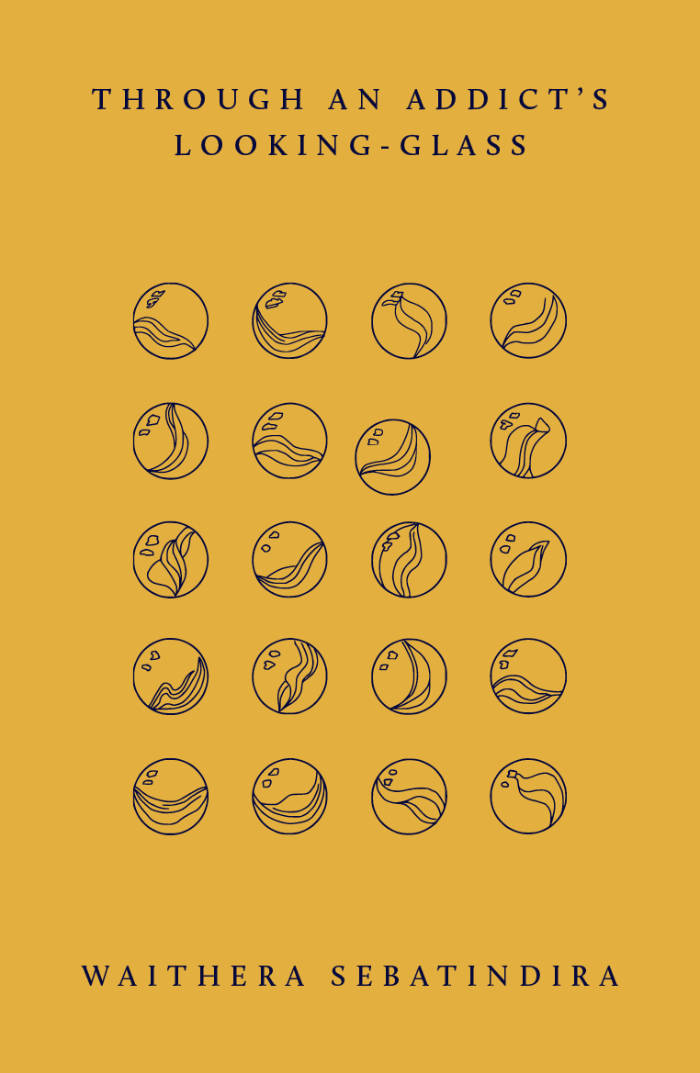
Through an Addict’s Looking-Glass
Through an Addict’s Looking-Glass is an exercise in meaning-making, a thinking-out-loud. Waithera Sebatindira unravels how it feels to live as an addict under capitalism, pondering how engaging with these experiences could bring the horizon of liberation towards us.
Through embodied explorations of addiction and recovery, Sebatindira invites us to inhabit crip time, a concept that describes different temporal realities in the lives of disabled people. In this collection, the addict’s crip time is distorted, mutable and non-linear, hopping backwards and forwards through memory loops and memory loss. Blackout is time travel; sobriety is failure; finitude, freedom.
An uncompromising rejection of the objectification of addicts across the political spectrum, this powerful meditation on illness, disability, solidarity and spirituality illuminates their indispensable contributions to the building of a new world.
Waithera Sebatindira is a Kenyan writer based in London. Their previous writing and research interests have included food imperialism, drag kings and gender transformation. They are a co-author of A FLY Girl’s Guide to University.

The Stone House
A vivid, haunting tale of intergenerational trauma and survival under Israeli occupation.
A New Arab Book of the Year 2021.
The year is 1968. The recent Arab defeat in the Naksa has led to the loss of all of historic Palestine. In the midst of violent political upheaval, Mahmoud, a young Palestinian boy living in the Galilee, embarks on a school trip to visit the West Bank for the first time.
For Mahmoud, his mother and his grandmother, the journey sets off a flood of memories, tracing moments that bond three generations together. How do these personal experiences become collective history? Why do some feel guilty for surviving war? Is it strange to long for a time never lived?
In this groundbreaking novella, Yara Hawari harnesses the enduring power of memory in defiance of the constrictions on Palestinian life. Against a system bent on the erasure of their people, the family’s perseverance is unbroken in the decades-long struggle for their stone house.
Yara Hawari is a Palestinian writer and political commentator. She completed her PhD in Middle East Politics at the University of Exeter, where her research focused on oral history and Indigenous Studies. She currently works as a senior analyst at Al-Shabaka, a Palestinian think tank. The Stone House is her first book.

Brick by Brick: How We Build a World Without Prisons
The fight for prison abolition is a struggle for collective liberation: a transformative vision of a safer world, in which communities live free from exploitation on a thriving planet.
Drawing connections across social justice movements with a shared abolitionist ethic, this revolutionary book illuminates how harmful ideas of criminality and punishment can manifest in many ways beyond the prison industrial complex. This work is a collaboration with friends, mentors and giants fighting for housing justice, food justice, climate justice, migrant justice, justice for survivors of violence, and more.
With this insightful and generous book, now in its second edition, Cradle Community invites us to explore what it will take to dismantle structures of oppression, and to imagine the future we can rebuild together—brick by brick.
Cradle Community is a collective of organisers committed to radical education and building understanding of prison abolition and transformative justice. Brick by Brick is their first book.

Experiments in Imagining Otherwise
This is a book of failure and mistakes; it begins with what is stolen from us and proposes only an invitation to imagine.
In these playful written experiments, Lola Olufemi navigates the space between what is and what could be. Weaving together fragmentary reflections in prose and poetry, this is an exploration of the possibility of living differently, grounded in black feminist scholarship and political organising.
Olufemi shows that the horizon is not an immaterial state we gesture toward. Instead, propelled by the motion of thinking against and beyond, we must invent the future now and never let go of the otherwise.
Lola Olufemi is a black feminist writer and CREAM/Stuart Hall Foundation researcher from London. Her work focuses on the uses of the feminist imagination and its relationship to futurity, political demands and imaginative-revolutionary potential. She is the author of Experiments in Imagining Otherwise and Feminism, Interrupted: Disrupting Power, the co-author of A FLY Girl’s Guide to University, and a member of ‘bare minimum’, an interdisciplinary anti-work arts collective.

Magical Realism. Imagining Natural Dis/order
Exhibition catalogue published on the occasion of the exhibition Magical Realism: Imagining Natural Dis/order at WIELS, Brussels presented from 29 May to 28 September 2025.
How do we imagine life in a world facing global upheaval and ecological challenges?
This book, as well as the exhibition it accompanies, is an invitation to move away from systems driven by endless growth and resource extraction, encouraging renewed ways of conceiving of the ‘natural’ world. When the world of science and hard facts has been separated from the world of magic and intuition, how do we bridge this divide, what are the after-effects and how do we repair? Magical Realism examines how the porosity between ‘magic’ and ‘reality’
may open up spaces for other horizons to emerge in response to proliferating monocultures, precarious lives and climate change. At the confluence of analysis and speculation, the authors and the artists brought together in this book explore paths towards restoring connections in a biosphere exhausted by exploitation, dispossession and debt.
Texts by Karen Barad, Federico Campagna & Febe Lamiroy, Chris Cyrille-Isaac, Sofia Dati, Vinciane Despret & Letícia Renault, Zayaan Khan, Shayma Nader, Susan Schuppli, Dirk Snauwaert.

Where the Bird Disappeared
This lyrical novel, set in the surroundings of the Palestinian village of Zakariyya, weaves a narrative rich in sensory detail yet troubled by the porousness of memory. It tells the story of the relationship between two figures of deep mythical resonance in the region, Yahya and Zakariyya, figures who live in the present but bear the names—and many traits—of two saints. Ranging from today into back to pre-1948 Palestine, the book presents both a compelling portrait of a contemporary village and a sacred geography that lies beyond and beneath the present state of the world. Sensual, rich in allusion, yet at the same time focused on the struggles of today, Where the Bird Disappeared is a powerful novel of both connection and dispossession.
Ghassan Zaqtan (Arabic غسان زقطان) is a Palestinian poet, author of ten collections of poetry. He is also a novelist, editor. He was born in Beit Jala, near Bethlehem, and has lived in Jordan, Beirut, Damascus, and Tunis.

It begins in your bank and extends to your throat
This text begins with the mishearing of a word. It starts from the place of inconvenience and unravels a hearing not contained within one fixed conversation. A hearing that has been expanded into a writing that begins in your bank and extends to your throat when its language heard writes itself into and onto the muscles.
It begins in your bank and extends to your throat ruminates on how digital algorithms turn words into capital, disciplining language and the body. Its writing explores how search engines link profitability to vocabularies and how productivity dictates posture, raising whether we can separate language and our bodies from economic structures.

Local Woman
A pulpy, mytho-poetic dispatch from an “anarchist jurisdiction” that explores the liberatory possibilities of community and womanhood.
Enter: Local Woman, an archetypal figure, fresh from the forest into the streets of Portland, Oregon. She is a Black trans woman, seeking survival and satisfaction, giving seduction, disenfranchisement, and the contradictions of femme womanhood a face, body, and soul. In sensual, evocative lyrics, Jzl Jmz documents Local Woman’s movement through natural disaster, anti-fascist protest, romantic engagements, and an expanding sense of personal autonomy.

The Golden Book of Words
This landmark early book (its original printing by Angel Hair Books was 750 copies, and they are now extremely rare) by the late great Bernadette Mayer is finally available again, both as a tribute and a joy to read. Mayer was a marvelous poet in every stage of her long and prolific writing life, but many fans especially relish her restless, powerful, sexy, and erudite early work. One of her signal elements is a certain deadpan wit, on full display here with classics such as “Lookin’ Like Areas of Kansas” or “What Babies Really Do,” or the marvelous “Essay”:
I guess it’s too late to live on the farm
I guess it’s too late to move to a farm
I guess it’s too late to start farmingI guess farming
is not in the cards now...
I guess farming is really out...
I don’t want to be a farmer but my mother was right
I should never have tried to rise out of the proletariat
Unless I can convince myself as Satan argues with Eve
That we are among a proletariat of poets of all the classes
Each ill-paid and surviving on nothing
Or on as little as one needs to survive
Steadfast as any farmer and fixed as the stars
Tenants of a vision we rent out endlessly
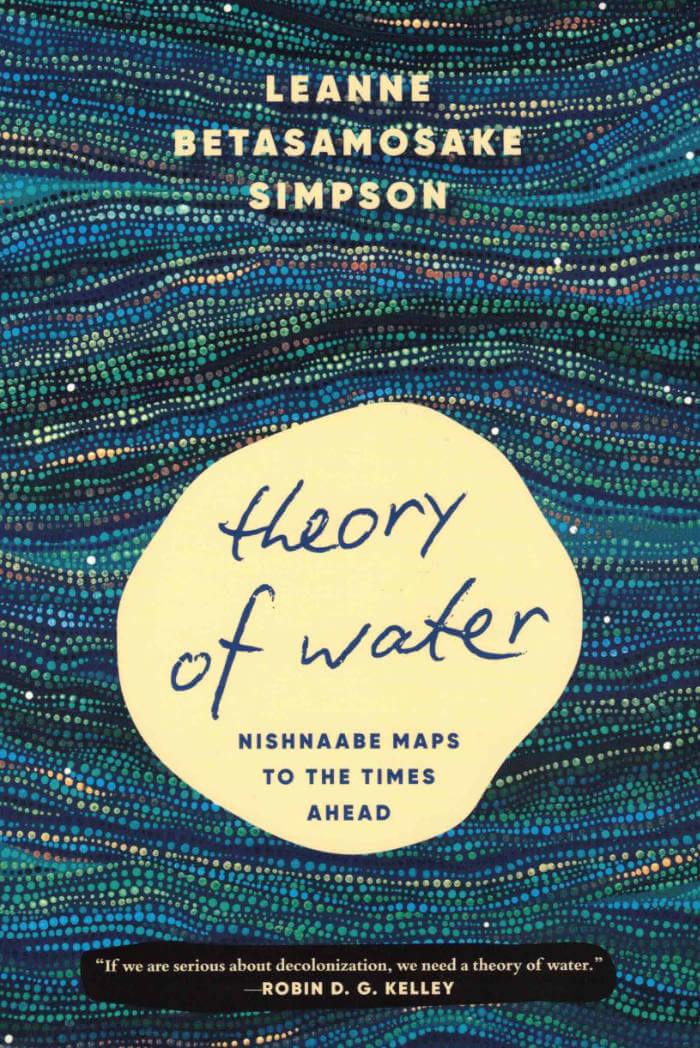
Theory of Water
A genre-bending exploration of that most elemental force—water—through Indigenous storytelling, personal memory, and the work of influential artists and writers.
For many years, Leanne Betasamosake Simpson took solace in skiing—in all kinds of weather, on all kinds of snow across all kinds of terrain, often following the trail beside a beloved creek near her home. Recently, as she skied on this path against the backdrop of uncertainty, environmental devastation, rising authoritarianism and ongoing social injustice, her mind turned to the water in the creek and an elemental question: What might it mean to truly listen to water? To know water? To exist with and alongside water?
So began a quest to understand her people's historical, cultural, and ongoing interactions with water in all its forms (ice, snow, rain, perspiration, breath). Pulling together these threads, Leanne began to see how a "Theory of Water" might suggest a radical rethinking of relationships between beings and forces in the world today. In this inventive work, Simpson draws on Nishnaabeg origin stories while artfully weaving the work of influential writers and artists alongside her personal memories and experience—and in doing so, reimagines water as a catalyst for radical transformation, capable of birthing a new world.
Theory of Water is a resonant exploration of an intricate, multi-layered relationship with the most abundant element on our planet—one that, as Simpson eloquently shows, is shaping our present even as it demands a radical rethinking of how we might achieve a just future.

As If They Had A Spirit: the practice of Pontus Pettersson
As If They Had A Spirit is the first comprehensive monograph of artist Pontus Pettersson. Using drawing and narration, the book expands on Pettersson’s sculptural, poetic and choreographic practice through the accounts and fabulations of long term collaborators. As If They Had A Spirit centers the acts of re-membering, re-telling and re-tracing as situated methods for documenting and studying the protracted and evolving nature of process-based artistic practices.
Recounted and drawn by Linnea Hansander, Robert, Malmborg, Diana Orving, Karina Sarkissova, Sandra Lolax, Stina Nyberg, Anna Koch, Peter Mills, Anna Efraimsson and Galerie (Simon Asencio & Adriano Wilfert Jensen)
Edited and redrawn by Galerie (Simon Asencio & Adriano Wilfert Jensen)
Editing assistance Izabella Borzecka
Published by Galerie, Int
Co-publisher & Distibribution: PAM, Stockholm
As If They Had A Spirit was made possible with generous support by the Swedish Arts Council, Weld, MDT and PAM

Riding In Silence & The Crying Dervish
The work of Iranian-Belgian artist Mashid Mohadjerin (°1976, Teheran) is an intricate tapestry of personal and collective memory, weaving together photography, text, video, and archival material to explore themes of displacement, resistance, and identity.
Family chronicles merge with momentous political events and are set against the background of a broader history of the MENA-region. Mohadjerin uncovers invisible nuances hidden beneath the extraordinary and the familiar.
In Riding in Silence & The Crying Dervish (2025), Mashid Mohadjerin draws from the depths of her family history, unraveling the echoes of migration, forced departures, and the quiet endurance of those caught between worlds. The book builds on her previous work, Freedom is Not Free (2021), where she explored the role of women in movements of resistance across the MENA region. However, in this latest series, she turns her gaze towards the intersection of masculinity, political ideology, and displacement, examining how historical forces shape personal narratives in ways both visible and unseen.

In Concrete
Garréta’s first novel in a decade follows the mania that descends upon a family when the father finds himself in possession of a concrete mixer. As he seeks to modernize every aspect of their lives, disaster strikes when the younger sibling is subsumed by concrete.
Through puns, wordplay, and dizzying verbal effect, Garréta reinvents the novel form and blurs the line between spoken and written language in an attempt to confront the elasticity of communication.
Anne F. Garréta is a graduate of the Ecole Normale Supérieure, received her License de Lettres at the Université Paris 4 (Sorbonne), her Maitrise and her D.E.A at the Université Paris 7 (Diderot), and a PhD at New York University. The author of six novels, Garréta was coopted to the Oulipo in 2000. Her first novel, Sphinx (1986), which caused a sensation when Deep Vellum published its first English translation in 2015, tells a love story between two people without giving any indication of grammatical gender for the narrator or their lover. She won France’s prestigious Prix Médicis in 2002 and the Albertine Prize in 2018 for her book, Not One Day, which was also nominated for a Lambda Literary Award. Garréta teaches regularly in France at the Université Rennes 2, and more recently at Paris 7 (Diderot), and is a professor at Duke University.